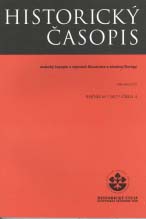Koncept kolektivní paměti - základní východiska a závěry
The concept of collective memory – basic starting points and conclusions
Author(s): Dušan Lužný, Jan VáněSubject(s): Psychology, Sociology, Culture and social structure , Social Theory, Sociology of Culture, Politics of History/Memory, Identity of Collectives
Published by: SAV - Slovenská akadémia vied - Historický ústav SAV
Keywords: Collective memory; Sociology; Narration; Schematic narrative templates;
Summary/Abstract: The study identifies the notion of collective memory and, particularly, its crucial elements that might be used as helpful research tools. It is based on the analysis of a memory thematizing socio-cultural context and of the existing sociological theories. It also draws on the findings of memory and cultural studies and psychology. The study identifies a total of 16 key elements (principles) of the collective memory concept, out of which the following are the most significant: a) understanding memory as a tool to understand and explain the present, b) addressing both the inner plurality of cultural memory and the plurality of cultural memories within a society, c) making the difference between the cultural and communicative memory, d) considering the significance of individual memory, e) understanding memory as narration, f) identifying the signification of schematic narrative templates.
Journal: Historický časopis
- Issue Year: 65/2017
- Issue No: 4
- Page Range: 577-590
- Page Count: 14
- Language: Czech

